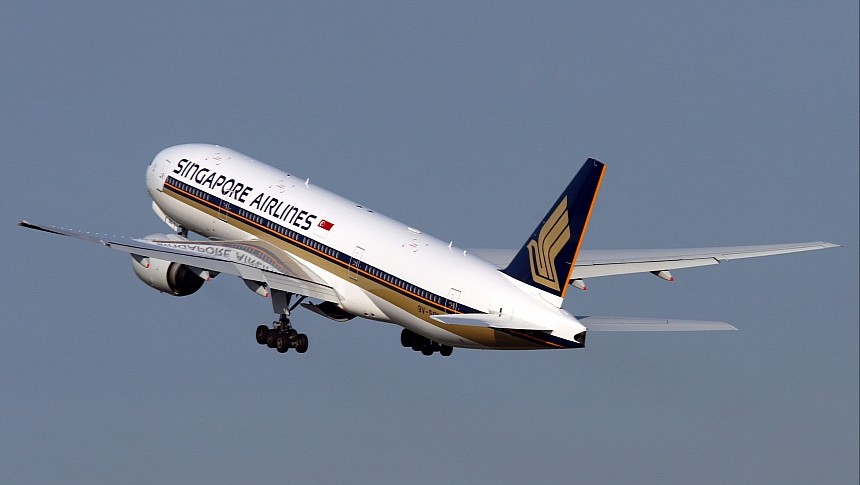Singapore's flagship airline, SIA, is operationally ready to integrate SAF (sustainable aviation fuel) into its regular operations, yet there are still important steps that need to be taken before that. This is the main finding of a complex pilot project that has unfolded for the past 20 months.
This SAF pilot resulted from the collaboration between SIA, the Civil Aviation Authority in Singapore (CAAS), and GenZero, an investment platform founded by Temasek, a global investment company. It started in February 2022, and over the next 20 months, it covered three areas: operational readiness, SAF credits, and market readiness.
The first pillar had to confirm SIA's ability to supply neat sustainable fuel to the Changi airport, turn it into blended SAF for operational use, and integrate it into existing flight operations without any modifications to the existing infrastructure.
The results were optimistic, showing that it can be done, even though it's a complex process. It involves numerous steps. Once the fuel is purchased, it must blended with conventional jet fuel at local Singapore facilities to obtain the legally-certified ratio for commercial use. Next, it must be delivered to the airport and used for actual flight operations without additional infrastructure.
During the pilot program, 1,000 tonnes (1,102 tons) of neat SAF was delivered and then blended with conventional jet fuel at ExxonMobil's local facilities. This SAF quantity was expected to lower CO2 emission levels by more than 2,700 tons.
The entire supply came from a single company, Neste, which claims to be the largest SAF producer worldwide at the moment. Back in May, the Finland-based company celebrated the inauguration of its newly expanded refinery in Singapore, which was a milestone for the entire Asia-Pacific region.
With this expansion, Neste doubled its production capacity for Singapore and officially became the largest SAF producer globally. It currently operates large-scale refineries on three continents and continues to increase its capacity. It plans to produce 2.2 million tons of green jet fuel by 2026.
The neat SAF that SIA purchased for this program generated 1,000 SAF credits, corresponding to the projected target of cutting more than 2,700 tons of carbon emissions. Approximately two-thirds of these credits were successfully sold during the project, confirming that the local market is ready to support the transition to greener fuels. These types of credits are a way of "sharing the burden" when it comes to the financial costs of switching to alternative fuel.
In July 2022, SIA hit a milestone within this pilot project. It was the first time that blended SAF was used for departing flights at the Changi airport.
In the end, CAAS will use the feedback from this pilot to develop the Singapore Sustainable Air Hub Blueprint and establish the next steps for a full SAF transition.
The first pillar had to confirm SIA's ability to supply neat sustainable fuel to the Changi airport, turn it into blended SAF for operational use, and integrate it into existing flight operations without any modifications to the existing infrastructure.
The results were optimistic, showing that it can be done, even though it's a complex process. It involves numerous steps. Once the fuel is purchased, it must blended with conventional jet fuel at local Singapore facilities to obtain the legally-certified ratio for commercial use. Next, it must be delivered to the airport and used for actual flight operations without additional infrastructure.
During the pilot program, 1,000 tonnes (1,102 tons) of neat SAF was delivered and then blended with conventional jet fuel at ExxonMobil's local facilities. This SAF quantity was expected to lower CO2 emission levels by more than 2,700 tons.
The entire supply came from a single company, Neste, which claims to be the largest SAF producer worldwide at the moment. Back in May, the Finland-based company celebrated the inauguration of its newly expanded refinery in Singapore, which was a milestone for the entire Asia-Pacific region.
With this expansion, Neste doubled its production capacity for Singapore and officially became the largest SAF producer globally. It currently operates large-scale refineries on three continents and continues to increase its capacity. It plans to produce 2.2 million tons of green jet fuel by 2026.
The neat SAF that SIA purchased for this program generated 1,000 SAF credits, corresponding to the projected target of cutting more than 2,700 tons of carbon emissions. Approximately two-thirds of these credits were successfully sold during the project, confirming that the local market is ready to support the transition to greener fuels. These types of credits are a way of "sharing the burden" when it comes to the financial costs of switching to alternative fuel.
In July 2022, SIA hit a milestone within this pilot project. It was the first time that blended SAF was used for departing flights at the Changi airport.
In the end, CAAS will use the feedback from this pilot to develop the Singapore Sustainable Air Hub Blueprint and establish the next steps for a full SAF transition.







